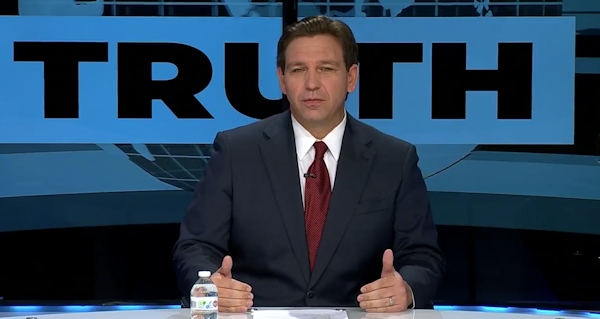SEJournal Online is the digital news magazine of the Society of Environmental Journalists. Learn more about SEJournal Online, including submission, subscription and advertising information.
 |
 |
| Florida Gov. Ron DeSantis, shown above at a February panel discussion he hosted on news media and defamation. Image: DeSantis Facebook Page. |
WatchDog Opinion: Florida Defamation Bills Could Signal Threat to First Amendment
By Joseph A. Davis
Defamation is a long shadow that still falls on U.S. journalism. Our free press laws are perilously poised to protect our right to print the truth.
Consider India for just a moment. Still viewed by many as the world’s most populous democracy, opposition leader Rahul Gandhi (no relation to the renowned independence figure) was recently expelled from parliament after being convicted of defaming Prime Minister Narendra Modi. Gandhi had called Modi a thief. Defamation law, in India and other countries, can be a way to stifle and remove political opponents.
Not in the United States, you say? Think again.
With the encouragement of Ron DeSantis,
Florida’s legislature is considering bills to
undermine defamation law in the state.
Right now, with the encouragement of Republican Gov. Ron DeSantis, Florida’s legislature is considering bills to undermine defamation law in the state. The Reporters Committee for Freedom of the Press is studying the bill and has expressed concern about it.
Florida, you may remember, was once called the “Sunshine State” partly because of its support for open government and open information. Those days are gone.
One reason why it matters is former President Donald Trump. During his 2016 campaign, Trump said he wanted to “open up” U.S. libel laws. He didn’t. That’s partly because he did not understand that U.S. federal libel law is not black-letter statute, but common law accumulated by many decades of court decisions.
We shouldn’t take too much comfort in that. What the courts have given, they may also take away.
Trump called the press the “enemy of the people.” He is also a master manipulator of the media. There is little doubt that in any future presidency, he would constrain the press if he could. Possibly with help from his friends in Congress or the state legislatures.
What about his friends on the Supreme Court?
Revisiting Times v. Sullivan?
Most journalists know that the key pillar of U.S. libel law is the 1964 Supreme Court decision in Times v. Sullivan. The court held that public officials could not be harmed by statements merely because they were false — but only if they were made with “actual malice.” That is, if the defendant knew or should have known that they were false, but made them anyway.
Times v. Sullivan is currently undergoing a thorough test in the $1.6-billion case against Fox News brought by the Dominion voting machine company. No decision has been reached yet, but Dominion has produced buckets of evidence that Fox broadcasters knew that their assertions that Dominion’s machines took votes from Trump in 2020 were false, but aired them anyway. The case is in a Delaware Superior court, but could still influence libel law nationally.
First Amendment supporters are cautiously optimistic that the case will not harm the Sullivan “actual malice” standard — if only because the evidence of deliberate untruth is so strong. But more lawyers and more courts could get involved before the shouting has ended.
Moreover, if this or any other case does get to the Supreme Court, there is little reason to think a majority on the Court would overturn it. Only two justices seem inclined that way. Justice Clarence Thomas has called for a review of the Sullivan standard, and Justice Neil Gorsuch has also expressed skepticism about it. But that’s it.
The current court declined to review Sullivan in its decision in June 2022 not to review a defamation case brought by Coral Ridge Ministries. That could settle it (knock on wood).
Legislation could change equation
But legislative action, whether by a state legislature or by Congress, could change the equation. If a law redefined libel or defamation, it would have an effect on many cases unless the court overturned it. The court could also overturn it on Constitutional grounds.
The two Florida bills do not totally eliminate libel defenses. Emily Hockett of RCFP writes that both bills would nullify Florida’s reporters’ privilege law in defamation cases. Florida is one of many states which protects reporters from being compelled to disclose confidential sources. Both bills also make it easier to sue for defamation when the challenged statement comes from a confidential or unknown source.
We will soon enough have more clues about the outcome of the Dominion v. Fox case. But resolution could take a lot of time if the case works its way up the appeals chain.
In the meantime it will be wise to watch for any legislative efforts similar to Florida’s — not only in other state legislatures, but in the Republican House and in the election campaigns as well. And it’s always a good time to shore up legal and political support for a free press.
Joseph A. Davis is a freelance writer/editor in Washington, D.C. who has been writing about the environment since 1976. He writes SEJournal Online's TipSheet, Reporter's Toolbox and Issue Backgrounder, and curates SEJ's weekday news headlines service EJToday and @EJTodayNews. Davis also directs SEJ's Freedom of Information Project and writes the WatchDog opinion column.
* From the weekly news magazine SEJournal Online, Vol. 8, No. 14. Content from each new issue of SEJournal Online is available to the public via the SEJournal Online main page. Subscribe to the e-newsletter here. And see past issues of the SEJournal archived here.












 Advertisement
Advertisement 



